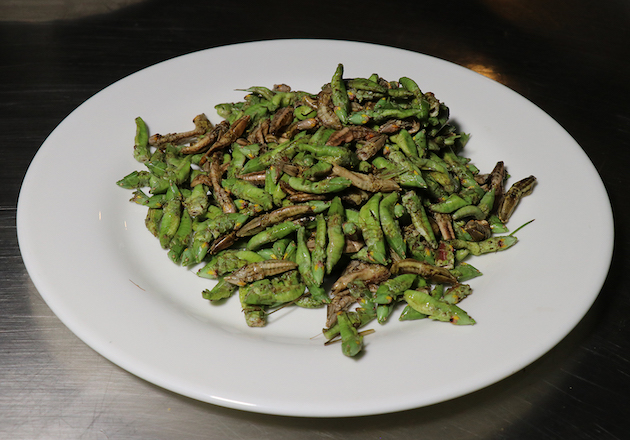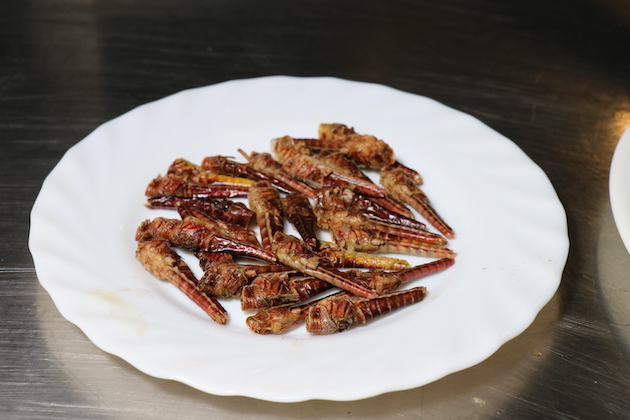Give Edible Insects a Chance as an Alternative High-Quality Protein Source, say Scientists — Global Issues


Nairobi, May 6 (IPS) – Growing up in Samoya village, Bungoma county, western Kenya, Elvis Wanjala has indescribable childhood memories of the rainy season, chasing black-bellied termites in the rain.
“Termites will also enter the house, attracted to the light in the late evening. My mother would dry the termites in the sun and deep-fry them. Then we will eat crispy termites with ugali (posho) and a traditional serving of vegetables,” he recounts.
“I grew up believing that everyone eats termites. When I was 11, I visited my uncle in Nairobi and was shocked to discover that termites are more of a nuisance than food. One morning after a downpour, I watched in amazement as women and girls swept termites from the doorstep and threw them in the bin. ”
Beatrice Karare from the Ministry of Agriculture, Livestock and Fisheries says IPS termites and other insects such as grasshoppers, locusts, black and white ants, and crickets are part of a traditional diet in Western Kenya , but not in other parts of the country.
But with inflation rising, scientists at International Center for Insect Physiology and Ecology (icipe) states that edible insects are a low-cost alternative to more expensive foods. Kenya’s ‘food basket’ indicates that food inflation increased by 20% in January 2022 compared to the same period in 2021.

Dr. Saliou Niassy, a scientist from icipesays IPS edible insects contain high-quality protein, vitamins, fiber, calcium, iron, B vitamins, selenium, zinc, amino acids and are also a great source of healthy fats.
Insect oil is produced through a icipe Research project from two species of edible insects – desert locusts and African bush crickets – richer in omega-3 fatty acids, flavonoids and Vitamin E than vegetable oils.
Niassy says as the East African nation grapples with growing threats to food security such as “climate change, landscape degradation and pest infestation, edible insects are a viable and affordable alternative.” Africa’s $35 billion annual food import bill is expected to grow to $110 billion by 2025.
A survey conducted by icipe shows that there are an estimated 500 species of edible insects in African communities. The Central African region is home to about 256 species of edible insects. East Africa has about 100 species, and about 8 species are available in North Africa. An estimated 17 major species are used for food and drink in Kenya.
“We have faced two main challenges with increasing insect consumption, namely the lack of legislation on the production, packaging and marketing of insects for food, and a strong awareness of what is regulated by the culture. acceptable as food. There are also many people who believe that you have to be very poor to eat insects,” explains Karare.
Karare said some of these issues were resolved in December 2020 when Kenya became the first African country to develop national standards regulating the production, handling and processing of insects for food. and animal feed.
Included in the regulation are the minimum necessary infrastructural and environmental requirements for the ideal production of edible insects, including how they are packaged and presented. .
Wanjala, now a teacher in Nairobi, says that communities that don’t eat insects and children can be introduced slowly to insect products like cookies “so that the idea of eating insects can slowly sink in.” When eating insects as well, I find that people are also more likely to try dry, crispy fried insects.”
Despite the challenges of creating an attractive and viable market for insects, Karare believes that insects can be part of the diet in many families, paralleling the journey of Kenyans. accept traditional vegetables.
“A few years ago, a small number of communities ate traditional vegetables with high nutritional value. For example, in Central Kenya, amaranth is considered food for the poor. Today, amaranth is a popular delicacy and part of menus in five-star hotels. Same goes for pumpkin leaves,” commented Karare.
“We need to educate people that edible insects can add nutrients to a plant-based meal. More importantly, insects could even replace meat nutritionally.”

According to Food and Agriculture Organization of the United Nations (FAO), an estimated 2.5 billion people eat insects as part of their daily meals, whole or in processed food products such as snacks and pasta. Karare said the global edible insect market is estimated to reach $112 million in 2019, which could reach $1.5 billion by 2026.
There are about 1,900 edible species globally, including butterflies, cockroaches, crickets, grasshoppers, ants, bees, dragonflies, beetles, domestic silkworms, centipedes, and locusts.
According to FAO, the switch to eating insects is not only good for the body but also very friendly to the environment and can contribute to reducing harmful greenhouse gas emissions. The livestock industry makes a significant contribution to climate change as global livestock emissions account for 14.5% of all anthropogenic greenhouse gas emissions.
Cattle are raised for meat and milk, and non-edible outputs such as manure and electricity account for 65% of livestock emissions. The FAO says the production of insects for food is another alternative to reducing harmful greenhouse gas emissions.
Crickets need six times less feed than cattle, four times less than sheep, and half as much as pigs and broilers to produce the same amount of protein. In addition, insect products were found to have a much smaller carbon footprint than conventional livestock.
With these revelations, Niassy says there is so much more to learn and benefit from, “we are just scratching the surface of the sustainable access to biodiversity for recovery, livelihoods, security Food and Nutrition in Africa”.
Report of the United Nations Office IPS
Follow @IPSNewsUNBureau
Follow IPS News UN Office on Instagram
© Inter Press Service (2022) – All rights reservedOrigin: Inter Press Service


